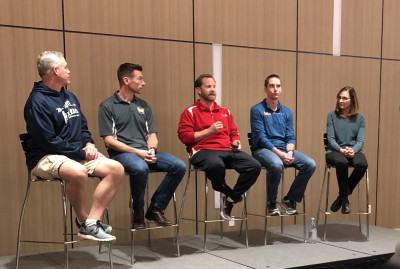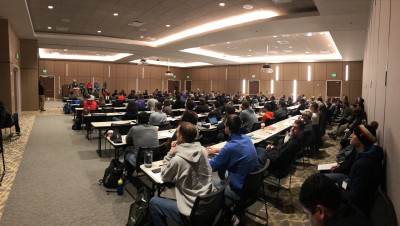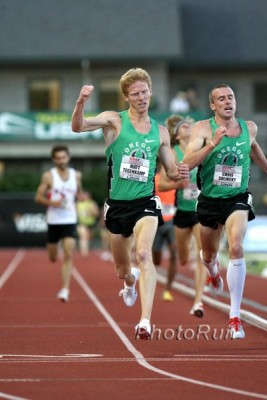10 Things I Learned From the Best High School Cross Country and Track Coaches in America
By Weldon Johnson
January 19, 2018
Last weekend I went to the Boulder Running Clinics’ High School Clinic put on by Jay Johnson of Running With the Buffaloes fame and CoachJayJohnson.com. Full disclosure, I found out about the clinic because they were an advertiser on LetsRun.com. I was so impressed by the roster of speakers, that I paid my own way to fly out and attend the clinic. Speakers included the coach of this years NXN boys’ champions, Joan Hunter (Drew Hunter‘s mom) of Loudoun Valley (VA); the coach of the NXN girls’ runners-up, Dan Iverson of Naperville North (IL); the coach of the 3rd place NXN boys’ team, Jonathan Dalby of Mountain Vista (CO); the coach of the 2015 NXN boys’ champ, Doug Soles of Great Oak (CA); and John O’Malley of Sandburg (IL), the coach of 2017 Foot Locker champ Dylan Jacobs. O’Malley also coached 2009-10 Foot Locker champ Lukas Verzbicas, making him the only person to have coached two different Foot Locker champs. I’m glad I made the trip.
The brief bios above don’t do justice to the accomplishments of the speakers at the clinic. Click here for their full bios which show their tradition of success.
Here are some broad points I learned. I’m also starting a thread: “I attended a clinic with the top high school cross coaches in the country: ask me anything.”
1) I left inspired
First, I want to thank the coaches for leaving me inspired. Being at the clinic I realized the high school coaches of America are the running lifers who are the lifeblood of LetsRun.com. It was refreshing to be a level or two removed from the professional end of the sport and be inspired by these coaches who are dedicating a big part of their lives to helping high school kids get the most out of the sport we love so much.
2) Culture, culture, culture
I thought I was going to attend the clinic and be focused on what type of workouts everyone does. Real quickly I realized the workouts are not the primary indicator when it comes to continued high school success. Some of it may be due to the fact that at the high school level you can’t recruit, and I’m not saying talent and workouts don’t matter, but if you want to have a top-notch high school program year-in and year-out, first and foremost you’d better have buy-in from the kids and parents. All the coaches at the clinic have built programs where the kids realized that to be super successful at running, you need to put in a lot of work and make this a year-round sport (some of their athletes initially do other sports as well, but most don’t as they get older). Distance running is primarily an aerobic activity and if you don’t put in the mileage, you can’t be good.
3) The top high school runners train like college runners
If you want to know why high school kids are so fast these days, it’s because their coaches are very knowledgeable and make their kids train smart. The intensity and volume of college programs is definitely higher than at the programs from the high school coaches I heard from, but I couldn’t believe the level of detail these programs put in and I felt it exceeded that of what I did in college 20 years ago. Every program but one had a summer camp, some had morning runs (Great Oak has a first period solely dedicated to running), and all put a lot of attention to drills and/or weights to get runners to stay healthy. Even if your program has your kids running really smart, if that’s all you’re doing, it won’t be enough to beat these coaches. These coaches have their kids doing the ancillary stuff that keeps their athletes healthy.
4) There are many ways to skin a cat
While all the coaches all had the same basics — I.E. tons of runners taking this seriously, training largely year-round, doing things to stay healthy, a commitment to excellence — the programs vary a decent amount on what they do, not only in terms of workouts, but in tools they use. Some use training logs, some don’t. Some probably run a minute faster a mile on their easy runs than others, etc. Yet all these coaches have had tremendous success. The buy-in, the culture, the dedication, and the talent are perhaps more important for team-wide success than anything else.
5) Anyone can coach a state champion
One of my favorite lines was from Coach Soles. He said, “Anyone any here could coach [former Great Oak star] Destiny Collins (4:40/9:53 PRs in high school) to a state championship.” I think his point was a good one: a coach can only take so much credit for his top runners. Most of individual success has to do with God-given talent mixed with hard work. The coach can make a big difference on the margin. Continued success as a team is harder and is about building a culture of success, getting kids dedicated to success, and training smartly. I found all the coaches to be proud of what they built, but also humble about it. Coach Iverson said, “I haven’t won seven state championships,” pointing out, much to his chagrin, that he never qualified as an individual for the state meet in high school, which actually ended up working out pretty well for him, as it led him to running for famed coach Al Carius at North Central College (18 D3 national titles). Coach Carius laid the foundation for Iverson’s own coaching success (see the next point).
6) The running world is very small
One of the best things about the running world is how everyone is one or two degrees of separation from everyone else. Coach Iverson ran for Coach Carius at North Central. Coach Dalby’s high school teammate was Matt Tegenkamp (Olympian, US 2 mile record holder). His high school coach was Dave Denny, who was also the high school coach of Joe Falcon (six-time NCAA champ, 3:49 miler and Oslo Dream Mile winner). Coach O’Malley was the coach of both Lukas Verzbicas and Dylan Jacobs. Joan Hunter’s son is Drew, and she coached Alan Webb his freshman year of high school. None of these things are coincidences. Everyone is passing down their information and continuing to learn from those before them.
7) What are you doing to keep your kids healthy?
I still believe distance running is about how much (this isn’t just about volume, etc.) you can train without getting injured and these coaches proved it. I had to leave before the clinic was over so I actually missed this lecture, but I saw this stat in the book of slides they gave out: John O’Malley said in the last six years, he’s had 390 kids go through his program and they’ve had a total of two stress fractures. That is absolutely amazing with how much these kids are running. Joan Hunter said when she coached a decade ago, her runners used to get injured a lot more than they do today, as she puts more emphasis on keeping them healthy. What are you doing to keep your runners healthy?
8) Don’t forget the mental side
All the coaches never forgot that they were dealing with not only human beings, but high school kids. And a key part of any runner’s success, but maybe even more so for a high school kid, is their mental makeup. What makes them tick? Coach O’Malley told the story of Dylan Jacobs at Foot Locker this year. Dylan’s season had been smooth sailing until the state meet when he got sick. He then tried to make up for it at NXN, went into the race with that mindset, and it didn’t go well (he finished 13th).
The focus for over a year had been on trying to win Foot Lockers and Coach O’Malley had had Dylan watch Lukas Verzbicas’ Foot Locker race over and over, visualizing it, telling him he’d make his move on the downhill just like Verzbicas. Well now the week was here they had been visualizing for over a year, and Dylan was not in the best mental state. Coach O’Malley got the word out to all the coaches, alumni, and people associated with the program that they were going to love Dylan to death the week of the race. Alumni and coaches wrote him letters of encouragement. O’Malley never explicitly told Dylan what was going on, but he was trying to get him in the right mindset.
Dylan’s mom had been diagnosed with breast cancer during the season and opted to delay her chemotherapy until after the season so she could go watch Foot Lockers. When the Midwest team got its team kits, they were (breast cancer support color) pink, and that was the coolest thing ever to Dylan. O’Malley said he was totally confident Dylan was going to win the race because mentally he was in the right place. During the race, O’Malley said Dylan gestured and yelled to him “Coach, this is awesome!” Then Dylan made the move he had visualized for a year, pulling away just like Verzbicas at nearly the same spot, and became a Foot Locker champion just like Verzbicas. Coach O’Malley said none of this would have worked with Verzbicas, who would have been of the mindset Foot Lockers was a business trip.
9) Coaches have no excuse not to be good
Coach Iverson said it best: “we’re at unprecedented levels of information” in regards to training. It used to be very hard to find, but now it’s just a click away on the internet. Information overload may be a problem, but coaches have no excuse not to know the basics of training and putting it together. The coaches at the clinic are going a few steps further, honing their crafts, going to clinics, learning from the best. Coach O’Malley somehow got in touch with Brad Stevens, then coach of Butler University, now coach of the Boston Celtics, and drove down his entire staff to talk to him. A few of the coaches talked about the resources at Altis, whose head coach is Dan Pfaff, one of two guys I think is a genius in the sport.
 10) These coaches are first and foremost educators
10) These coaches are first and foremost educators
I was amazed at how much information these coaches shared. Some of them were willing to share all their workouts. Now, if one team copies another team’s workouts, it’s probably not a pure recipe for success, but I think these coaches were so willing to share because, with the exception of Joan Hunter, who did homeschool some of her kids, all of them were teachers as well. Educators are always looking to learn and help kids grow. To do that, you need to keep gathering and sharing information. I noticed an illustration by Tanmay Vora on the Altis website that says, “The Best Leaders are Constant Learners.” Thanks to all the coaches for being so willing to share and learn. It was a great day and a half at the clinic for me.
More discussion: “I attended a clinic with the top high school cross coaches in the country: ask me anything.”
Photos from clinic via Jay Johnson. Jay also reports that videos from the clinic will be available for purchase in February.



